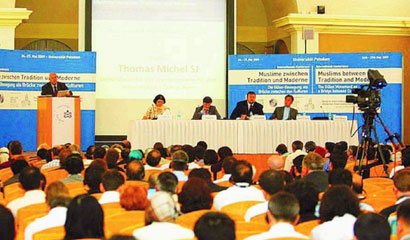Gülen's Teachings Discussed at International Conference in Berlin
 The ideas, worldview and teachings of Fethullah Gülen, a Turkish Islamic scholar known for his promotion of mutual understanding and tolerance between cultures, were discussed at a two-day international conference at Potsdam University in Berlin on Tuesday and Wednesday.
The ideas, worldview and teachings of Fethullah Gülen, a Turkish Islamic scholar known for his promotion of mutual understanding and tolerance between cultures, were discussed at a two-day international conference at Potsdam University in Berlin on Tuesday and Wednesday.
Intellectuals attending the conference, titled "Muslims between Tradition and Modernity: The Gülen Movement as a Bridge between Cultures," highlighted Gülen's contributions to world peace. Stressing that Gülen tries to bring people together by underlining international values and avoiding discrimination based on language, religion and race, they drew attention to the fact that world peace could be assured on the common ground of humanity through mutual understanding and approaches free of prejudice. Scientists, journalists, businessmen, NGO representatives and students attending the conference, which was organized by Potsdam University's Institute of Religion and Forum for Intercultural Dialogue Berlin (FID) in cooperation with the German Orient-Institute, Abraham Geiger College and the Protestant Academy Berlin, were able to listen to the opinions of a number of intellectuals on the subject of intercultural and interfaith dialogue.
Sabien Kunst, dean of Potsdam University, referred to the common ground of the three Abrahamic religions and said people should refrain from categorizing everything as black and white. Professor Bernhard Kroener called for respect for differences. “Dialogue is mutual respect. It is respect for a person and different ways of worship,” he said.
Presenting a paper titled “How to Make Strangers,” Professor Wolfgang Kaschuba from Humboldt University said “making strangers” and alienating “others” is a problem in European culture, adding that Muslims are seen as the new enemies in Germany and Europe. Noting that prejudices against Muslims are incited in various fields, he said Muslims are working against this prejudice by participating in civil society.
Arguing that Islam is compatible with democracy, FID Chairman Ercan Karakoyun said Gülen's teachings contribute to world peace. Stressing that the Gülen movement is a civil movement without any political concerns, he said followers of Gülen in a number of countries contribute to those countries with their efforts in the field of education.
Referring to those who accuse the Gülen movement of fundamentalism in Turkey, Russian Professor Leonid R. Syukiainen said it is not right to call Gülen, who opposes violence and promotes solidarity, an Islamist. “They do not want to see cultural aspects behind Gülen's thoughts. Islam does not only mean a religion. It is also a culture and a way of life. Islam, which is a civilization, also consists of universal value. … We can reconstruct modern society based on the basis of current universal values,” he stated. Noting that accusations against Gülen have spread to Russia, he explained why Turkish schools opened in Russia by Turkish volunteers are not called “Gülen's schools,” saying the schools do not belong to Gülen officially. Emphasizing that Gülen does not intend to change the political system in Turkey, he said, “Gülen wants human rights.”
Professor Bekim Agai, from the University of Bonn, said the activities of the Gülen movement in Germany do not comply with “classical immigrant model.” Noting that in order to understand the starting point of the movement one should examine Gülen's thought, he said the activities of the movement in Germany are seen as constructive. (Oktay Yaman, Berlin)
- Conference web site can be visited at http://uni-potsdam-guelen-konferenz.de
- Created on .
